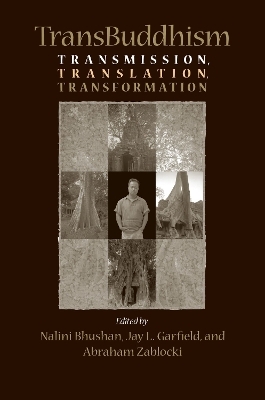
TransBuddhism
Transmission, Translation, and Transformation
2009
University of Massachusetts Press (Verlag)
978-1-55849-708-5 (ISBN)
University of Massachusetts Press (Verlag)
978-1-55849-708-5 (ISBN)
The global spread of Buddhism has given rise to new forms of religious complexity, both in the West and in Asia. This work explores the many manifestations of Buddhist thought and practice in America and elsewhere. It looks at the issues that arise in the translation of Buddhist terms, texts and concepts from one cultural milieu to another.
This work explores the many manifestations of Buddhist thought and practice in America and elsewhere. The global spread of Buddhism is giving rise to new forms of religious complexity, both in the West and in Asia. This collection of essays examines the religious and cultural conversations that are occurring in this process from a diverse range of disciplinary, methodological, and literary perspectives, including philosophy, ethnography, history, and cultural studies. The chapters in the first section explore the transmission of Buddhism to the West, ranging from the writings of one of its earliest western interpreters, the Wesleyan missionary R. Spence Hardy, to the globalization of Tibetan Buddhist reincarnation, to the development and practice of Buddhism within the American prison system. The concluding chapter of this section presents a case study of a Japanese Buddhist temple in Oregon which ultimately died out - an example of a transmission that failed. The second section looks at the complex issues that arise in the translation of Buddhist terms, texts, and concepts from one language or cultural milieu to another. Two chapters examine the challenges confronted by those who translate Buddhist texts - one exploring the contemporary translation of Tibetan Buddhism, the second analyzing an exchange of poetry in medieval Japan. The other two chapters describe the translation of Buddhist ideas into new cultural domains in America, specifically film and sports. The final section presents case studies in the transformation of Buddhism which is resulting from its new global interconnections. Topics include the role of women in transforming Buddhist patriarchy, Buddhist-Freudian dialogue in relationship to mourning, and the interplay between Buddhism and the environmental movement. The book also includes images created by the noted artist Meridel Rubenstein which frame the individual chapters within a nonverbal exploration of the themes discussed. In addition to the editors, contributors include Mark Blum, Mario D'Amato, Sue Darlington, Elizabeth Eastman, Connie Kassor, Tom Rohlich, Judith Snodgrass, Jane Stangl, and Karma Lekshe Tsomo.
This work explores the many manifestations of Buddhist thought and practice in America and elsewhere. The global spread of Buddhism is giving rise to new forms of religious complexity, both in the West and in Asia. This collection of essays examines the religious and cultural conversations that are occurring in this process from a diverse range of disciplinary, methodological, and literary perspectives, including philosophy, ethnography, history, and cultural studies. The chapters in the first section explore the transmission of Buddhism to the West, ranging from the writings of one of its earliest western interpreters, the Wesleyan missionary R. Spence Hardy, to the globalization of Tibetan Buddhist reincarnation, to the development and practice of Buddhism within the American prison system. The concluding chapter of this section presents a case study of a Japanese Buddhist temple in Oregon which ultimately died out - an example of a transmission that failed. The second section looks at the complex issues that arise in the translation of Buddhist terms, texts, and concepts from one language or cultural milieu to another. Two chapters examine the challenges confronted by those who translate Buddhist texts - one exploring the contemporary translation of Tibetan Buddhism, the second analyzing an exchange of poetry in medieval Japan. The other two chapters describe the translation of Buddhist ideas into new cultural domains in America, specifically film and sports. The final section presents case studies in the transformation of Buddhism which is resulting from its new global interconnections. Topics include the role of women in transforming Buddhist patriarchy, Buddhist-Freudian dialogue in relationship to mourning, and the interplay between Buddhism and the environmental movement. The book also includes images created by the noted artist Meridel Rubenstein which frame the individual chapters within a nonverbal exploration of the themes discussed. In addition to the editors, contributors include Mark Blum, Mario D'Amato, Sue Darlington, Elizabeth Eastman, Connie Kassor, Tom Rohlich, Judith Snodgrass, Jane Stangl, and Karma Lekshe Tsomo.
NALINI BHUSHAN is professor of philosophy at Smith College. JAY GARFIELD is Doris Silbert Professor in the Humanities and professor of philosophy at Smith College. ABRAHAM ZABLOCKI is assistant professor of religious studies at Agnes Scott College.
| Erscheint lt. Verlag | 30.1.2010 |
|---|---|
| Zusatzinfo | 15 illustrations |
| Verlagsort | Massachusetts |
| Sprache | englisch |
| Gewicht | 472 g |
| Themenwelt | Geisteswissenschaften ► Religion / Theologie ► Buddhismus |
| ISBN-10 | 1-55849-708-0 / 1558497080 |
| ISBN-13 | 978-1-55849-708-5 / 9781558497085 |
| Zustand | Neuware |
| Haben Sie eine Frage zum Produkt? |
Mehr entdecken
aus dem Bereich
aus dem Bereich
Philosophische Betrachtungen
Buch | Softcover (2024)
Aufbau TB (Verlag)
CHF 20,95
Unterweisungen in Zen-Meditation
Buch | Hardcover (2024)
Arkana (Verlag)
CHF 29,90


